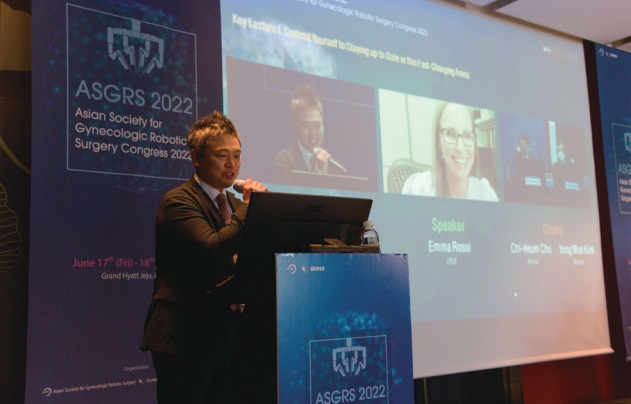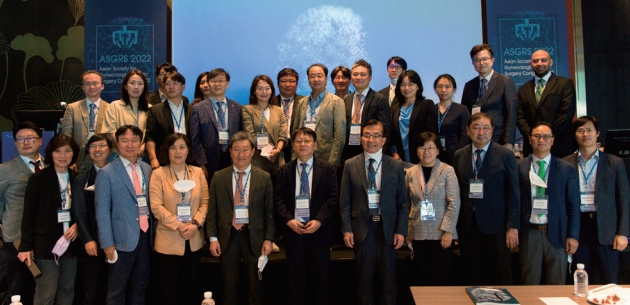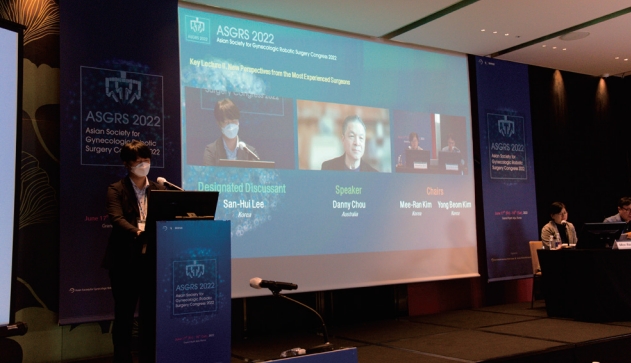Asian Society for Gynecologic Robotic Surgery Congress 2022, a start of new chapter
Article information
The Asian Society for Gynecologic Robotic Surgery Congress 2022 (ASGRS 2022) was held at the Grand Hyatt, Jeju Island, Korea, from Friday, June 17 to Saturday, June 18, 2022. This was the second international stand-alone robotic/Minimally Invasive Surgery gynecology meeting for robotic gynecology surgeons in Asia after our successful gathering Asian Robotic Gynecology Congress 2019. We could not gather due to an outbreak of COVID-19, however, ASGRS 2022 was a great start to get together from all over the world to enhance knowledge, accelerate skills and advance the field of gynecologic robotic surgery once again (Fig. 1). Because of COVID-19 many surgeons outside of Korea could not participate in person, however, many surgeons from over 10 different countries participated online enthusiastically. This 2 days of hybrid meeting/online congress consisted of six sessions, two key lectures and a satellite symposium for nurses and physician assistants.
FRIDAY, JUNE 17
The topic for the first key lecture on Day 1 was Commit Yourself to Staying up to Date in this Fast-Changing Arena. Emma Rossi (USA), Peter Lim (USA), Henrik Falconer (Sweden), and Valerio Gallotta (Italy) gave a lecture on three types of gynecological cancer: cervix, endometrium and ovary.
Emma Rossi from University of North Carolina, USA gave a Surgical tutorial for robotic sentinel lymph node biopsy (SLNB) in gynecologic cancers. She stated that robotic sentinel lymph node biopsy using indocyanine green is a useful strategy in the staging of apparent early stage endometrial and cervical cancers that is associated with a high degree of diagnostic accuracy (Fig. 2). Peter Lim of Nevada University, USA, gave a lecture on robotic radical hysterectomy to minimize tumor spillage. He indicated that it is unclear what factors contributed to inferior oncological surgical outcomes in Laparoscopy-assisted cervical cancer (LACC) trial. He also stated that it is important to recognize multiple factors which may have contributed to the inferior outcomes have not been well studied. Henrik Falconer of Karolinska University, Sweden, introduced the clinical problem, recent studies and the implementation of SLNB in endometrial cancer. Valero Gallotta from Italy represented robotic surgery as a safe and feasible approach to treat early stage ovarian cancer and recurrent ovarian cancer in terms of staging, complications and oncological outcome.

Jiheum Paek (Chair of Scientific Programme of the Asian Society for Gynecologic Robotic Surgery Congress 2022, Ajou University Hospital, Korea) discussing about surgical tutorial for robotic sentinel lymph node biopsy in gynecologic cancers with Emma Rossi online.
The Day 1 also included four sessions which were filled with various topics of benign and malignant gynecology in robotic surgery for beginners and experienced surgeons and it sparked heated discussions with a wide variety of opinions. There were featured oral presentations which were great opportunities for beginners of robotic gynecologic surgery to present their point of views in robotic gynecology surgery.
STAURDAY, JUNE 18
The key lecture on Day 2 was about New Perspectives from the Most Experienced Surgeons. Xiaoming Guan (USA), Kenneth Kim (USA), and Danny Chou (Australia) shared their experiences, tips, and tricks for robotic surgery in diverse views. Xiaoming Guan from Baylor College of Medicine, USA talked about robotic assisted transvaginal NOTES in gynecologic surgery and introduced the basic skills of RVONTES as well as advanced skills for complex surgeries. Kenneth Kim of Cedars-Sinai Medical Center, USA spoke about machine learning & AI: a new era in robotic surgical performance. Danny Chou from Sydney Women’s Endosurgery Centre, Australia gave a presentation on robotic surgery for deep infiltrating endometriosis (DIE). He shared his experience with the use of robotic technology for DIE for rectosigmoid colon, diaphragm, and sciatic nerve. He also introduced a modified rectal shaving technique called Laparoscopic Reverse Submucosal Dissection (LRSD) or Sydney Shaving which his center has worked on (Fig. 3).
In addition, the Day 2 included two sessions on the basics for robotic system and the newest robotic approaches for gynecologic Disease and energetic discussions took place freely. And there was a satellite symposium for nurses and PAs which was very stimulating and educational experience.
This annual meeting is very meaningful as it is the first face-to-face meeting held in Asia after the 2020 Corona Pandemic. I think this hybrid meeting/online congress fully provided opportunity to educate, motivate, and embolden attendees to become more effective through partnerships among worldwide robotic gynecology surgeons, surgical teams, mentors/mentees, and industry partners. ASGRS showed a bright future of robotic gynecologic surgery through this congress and I hope that the next congress will be offline only without COVID-19.
Notes
Conflict of interest
No potential conflict of interest relevant to this article was reported.


